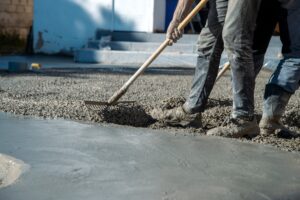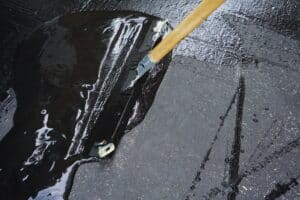Before you invest in sealcoating for your asphalt surface, you may be wondering how long it actually lasts. In this post, we’ll cover the factors that influence the lifespan of sealcoating, from climate to traffic patterns, and provide expert tips to help you get the most out of your investment. Understanding the ins and outs of sealcoating will help you plan future maintenance and ensure your asphalt remains in great condition for years to come.
How Long Does Sealcoating Last?
Sealcoating can last anywhere from 2 to 5 years. Given this large range, several factors can shorten or lengthen its lifespan:
Climate Conditions
The climate plays an important role in determining how long your sealcoating will last.
- Temperature Fluctuations: Extreme temperatures can expand and contract the sealcoat, leading to cracking. In regions with harsh winters, freeze-thaw cycles worsen the problem by causing structural damage that compromises the sealcoat’s effectiveness. In hotter climates, day-to-day exposure to high temperatures can lead to softening or even melting of lower-quality sealants. Property owners should keep a close eye on their asphalt pavement temperatures and conduct maintenance as necessary.
- Rainfall and Humidity: Continuous moisture weakens the bond of sealcoat. In rainy environments, sealcoating may need to be reapplied more frequently due to erosion and water damage. High humidity levels can also slow the curing process, leading to a less effective seal.
- Sun Exposure: UV rays can also break down the sealcoat over time through a process called “UV aging.” The harsh UV radiation causes the asphalt to fade and lose its protective qualities over time. Areas with lots of sunlight and a high UV index experience sealcoat fading and wearing down more quickly than in shaded or cooler areas. These hotter climates require more frequent maintenance for protection.
Traffic Patterns
The type and volume of traffic on your asphalt surface also affect the lifespan of your sealcoating.
- Heavy Traffic: Commercial properties with heavy vehicle traffic, such as trucks or delivery vehicles, will experience more wear and tear. The weight and busyness of vehicles degrade the sealcoat quicker and can form cracks, such as block cracking, transverse cracking, and longitudinal cracking. Also, the constant friction and pressure from tires can deteriorate the asphalt surface.
- Light Traffic: Residential driveways that see less/lighter traffic will generally maintain their sealcoat longer. Occasional vehicle use puts less stress on the sealcoat and there’s a lower chance of significant damage. However, even lightly used surfaces should be monitored.
Quality of Application
A high-quality sealcoat application is key for maximizing the lifespan of your sealcoat.
- Professional vs. DIY: Hiring professionals often guarantees proper preparation and application. Experienced contractors can identify underlying issues like cracks or potholes that need to be addressed before sealing, which leads to a longer-lasting finish. DIY projects may overlook some of these underlying concerns or lack the expertise needed to properly apply the sealcoat. These mistakes can cause premature and costly damages.
- Materials Used: The type of sealant used also affects longevity. High-quality sealants are more durable and can withstand the elements better than cheaper alternatives. For example, the cost-effective coal tar sealants may not provide the same level of protection as polymer-modified sealants.
Maintenance Practices
Regular maintenance can greatly extend the lifespan of your sealcoating.
- Cleaning: Keeping the surface clean from debris, leaves, and oil spills will help maintain the integrity of the sealcoat. Regular sweeping and occasional pressure washing can prevent deterioration. Neglecting to remove debris can trap moisture and lead to moss or algae growth, which can further damage the sealcoat.
- Repairs: Addressing cracks and potholes before sealcoating will extend the life of the sealant. Neglecting these repairs can lead to further damage, as water seeps into cracks and expands when frozen, which deteriorates the asphalt beneath.
How Often Should You Reseal Your Asphalt?
After an initial sealcoat, you might be wondering how often you should plan to reseal your asphalt.
General Recommendations
Most experts recommend resealing asphalt surfaces every 2 to 3 years. However, this can vary based on the factors discussed earlier.
- Lightly Used Driveways: If your asphalt is used infrequently or is primarily residential, you might extend the resealing interval to 3 to 5 years. It’s a good idea to keep an eye on the condition of your sealcoat and adjust your timing based on your observations.
- High Traffic Areas: For commercial properties or areas with heavy vehicle traffic, consider resealing every 1 to 2 years to maintain protection. The increased wear from constant traffic demands more frequent maintenance to prevent damage.
Signs That Resealing is Needed
Monitoring the condition of your sealcoating can help you determine when it’s time for a refresh:
- Fading Color: A noticeable loss of color or the appearance of a grayish tint indicates that the sealcoat is wearing down, from a process called oxidation. The darker color of a new sealcoat provides better UV protection and is more visually pleasing.
- Cracks and Potholes: Visible cracks or surface damage mean that the sealcoat no longer provides enough protection and should be reapplied. Waiting too long can cause these issues to worsen, leading to more costly repairs.
- Water Penetration: If water is pooling on the surface or penetrating the asphalt, it’s a clear sign that the sealcoat is no longer effective. Quick repairs are key as this can lead to problematic structural issues if left alone.
Seasonal Considerations
Timing your resealing project also influences its effectiveness.
- Best Time to Reseal: Late spring or early fall is usually the best time to apply a new sealcoat. During these seasons, temperatures are moderate, and there is less chance of rain, which is optimal for curing. Ideal temperatures range between 50°F and 85°F for best adhesion and durability.
- Avoiding Extremes: Avoid resealing during extreme temperatures, after rainfall, or when rain is forecasted within 24-48 hours after application. Temperature extremes can affect the curing process and lead to poor adhesion.
Tips to Maximize the Lifespan of Your Sealcoating
Here are some expert tips to help extend the life of your sealcoating:
Regular Maintenance
- Routine Inspections: As we’ve stressed, check for cracks, holes, and other signs of wear regularly. Early detection of problems can prevent more extensive damage down the line. A visual inspection every few months can help significantly.
- Cleaning: Regularly sweep and clean your asphalt surface to prevent debris buildup, which can trap moisture and cause deterioration. Leaf blowers can be effective for quick cleanups, and power washing can remove stubborn stains or oil spills.
Proper Drainage
- Ensure Good Drainage: Poor drainage can lead to water pooling, which weakens the sealcoat. Make sure that your asphalt surface is graded correctly to allow water to flow away. Installing drains or adjusting landscaping can help protect your sealcoat.
Avoiding Heavy Loads
- Limit Heavy Vehicles: If possible, restrict heavy vehicles from parking or driving on your sealed surfaces. This reduces wear and tear damage. Informing tenants or employees about weight limits can help prevent accidental damage from heavy loads.
Resealing Timely
- Follow a Schedule: Set a resealing schedule based on your property’s usage and environmental factors. Keeping a calendar reminder can prompt you to reseal at an appropriate time. Use your own discretion and keep in mind your asphalt condition.
Choose Quality Materials
- Invest in Quality Sealants: When it’s time to seal again, opt for high-quality sealants that offer better protection and durability. Researching reputable brands or consulting with professionals can guide you toward the best option for your specific needs.
By following these tips, your sealcoat can last up to 3 years before needing resealing. If you notice any cracks or damage, it’s important to address them promptly and seek professional help. Work with an asphalt repair and maintenance company that can provide regular maintenance and upkeep to prolong the life of your sealcoat and keep your asphalt looking pristine.
Looking to Sealcoat Your Asphalt? Superior Asphalt Is Here to Help
Keeping up with regular sealcoating has many benefits for your asphalt surface. By making the investment in a sealcoat, you can protect your asphalt while elevating its aesthetics. If you’re looking for sealcoating services, Superior Asphalt has you covered. We offer high-quality sealcoating and repair services to help you keep your surfaces in top shape for years to come. Contact us today for a property-specific quote!




